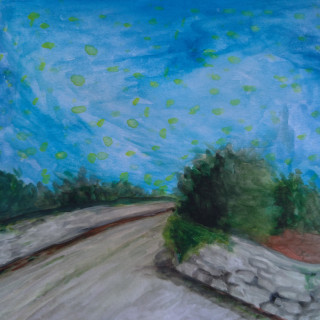
In a sense, this record is long overdue. For the better part of a decade now, Tetsu Mineta has been busy making “American” music (what some hazily refer to as the “American primitive”) from deep within a Japanese underground more commonly composed of those striving to get well clear of the traditional. Moreover, he has consistently done so with an authenticity as absolute as it is rare, and has managed to forge, from the very first moment, a style and a presence that feel fully formed, truly innovative, coolly Japanese, and undeniably his own.
A retrospective like the one you hold in your hands can have a way of insisting we proffer some explanation for the kinds of cultural intersection so fascinatingly on display here, as though we have arrived at customs with our hair mussed, our papers all out of order, and the officials are eyeing us now, suspiciously….
They’ll have their questions. How, for instance, are we to assess this transposition of largely black American musical idioms—Delta blues, Piedmont rags, barrelhouse drags—all so specifically situated in particular geographic and psychic locales, histories, traditions… experience, pain… onto a 21st Century Japanese canvas? And how is it that those styles can sit so naturally, so easily here beside more modern modes: psychedelic raga drones, lo-fi tape tomfoolery, moody torch songs? What is this sorcery?
Ultimately, as with most great art, we are met here by—and left to revel in—a certain measure of mystery. I have my own questions. Like, what is it about, say, “Scene #3” that is so incredibly transportive, so evocative of a deeply somber yet wholly welcome landscape? How to gauge the particular genius of that reedy sympathetic rattle that accompanies “Scene #33″‘s lower register like the snare at an old-fashioned Hill Country picnic? Accident? Guile? I’m not entirely sure. I only know I’m glad for it.
The pieces on this record are drawn from Tetsu’s first four releases, outings which have been very much admired but—for far too long now—by too small a number. They are, at times, disparate in form, demonstrating various facets of his art—but always natural, always comfortable, the way I imagine his company to be: casual, gregarious, warmly soulful. Spend some time with them, and see for yourself.
-C. Worth
October 2021
Hand-painted covers by Luigi Falagario
This is Ditch Lily #1, Unread #276, Union Pole UPLP02, and Almost Halloween Time AHT121.
Listen to ”Early Scenes” here.